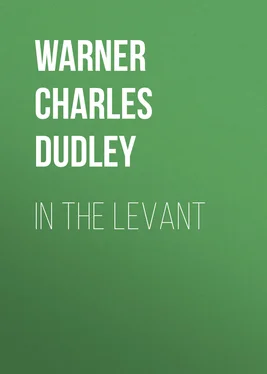Charles Warner - In The Levant
Здесь есть возможность читать онлайн «Charles Warner - In The Levant» — ознакомительный отрывок электронной книги совершенно бесплатно, а после прочтения отрывка купить полную версию. В некоторых случаях можно слушать аудио, скачать через торрент в формате fb2 и присутствует краткое содержание. Жанр: Путешествия и география, История, foreign_edu, foreign_antique, foreign_prose, на английском языке. Описание произведения, (предисловие) а так же отзывы посетителей доступны на портале библиотеки ЛибКат.
- Название:In The Levant
- Автор:
- Жанр:
- Год:неизвестен
- ISBN:нет данных
- Рейтинг книги:4 / 5. Голосов: 1
-
Избранное:Добавить в избранное
- Отзывы:
-
Ваша оценка:
- 80
- 1
- 2
- 3
- 4
- 5
In The Levant: краткое содержание, описание и аннотация
Предлагаем к чтению аннотацию, описание, краткое содержание или предисловие (зависит от того, что написал сам автор книги «In The Levant»). Если вы не нашли необходимую информацию о книге — напишите в комментариях, мы постараемся отыскать её.
In The Levant — читать онлайн ознакомительный отрывок
Ниже представлен текст книги, разбитый по страницам. Система сохранения места последней прочитанной страницы, позволяет с удобством читать онлайн бесплатно книгу «In The Levant», без необходимости каждый раз заново искать на чём Вы остановились. Поставьте закладку, и сможете в любой момент перейти на страницу, на которой закончили чтение.
Интервал:
Закладка:
Perhaps, however, it is best not to have a decent road to the Holy City of the world. It would make going there easy, even for delicate ladies and invalid clergymen; it would reduce the cost of the trip from Jaffa by two thirds; it would take away employment from a lot of vagabonds who harry the traveller over the route; it would make the pilgrimage too much a luxury, in these days of pilgrimages by rail, and of little faith, or rather of a sort of lacquer of faith which is only credulity.
Upon this plateau we begin to discern signs of the neighborhood of the city, and we press forward with the utmost eagerness, disappointed at every turn that a sight of it is not disclosed. Scattered settlements extend for some distance out on the Jaffa road. We pass a school which the Germans have established for Arab boys; an institution which does not meet the approval of our restoration driver; the boys, when they come out, he says, don’t know what they are; they are neither Moslems nor Christians. We go rapidly on over the swelling hill, but the city will not reveal itself. We expect it any moment to rise up before us, conspicuous on its ancient hills, its walls shining in the sun.
We pass a guard-house, some towers, and newly built private residences. Our pulses are beating a hundred to the minute, but the city refuses to “burst” upon us as it does upon other travellers. We have advanced far enough to see that there is no elevation before us higher than that we are on. The great sight of all our lives is only a moment separated from us; in a few rods more our hearts will be satisfied by that long-dreamed-of prospect. How many millions of pilgrims have hurried along this road, lifting up their eyes in impatience for the vision! But it does not come suddenly. We have already seen it, when the driver stops, points with his whip, and cries,—
“Jerusalem!”
“What, that? ”
We are above it and nearly upon it. What we see is chiefly this: the domes and long buildings of the Russian Hospice, on higher ground than the city and concealing a good part of it; a large number of new houses, built of limestone prettily streaked with the red oxyde of iron; the roofs of a few of the city houses, and a little portion of the wall that overlooks the Valley of Hinnom. The remainder of the city of David is visible to the imagination.
The suburb through which we pass cannot be called pleasing. Everything outside the walls looks new and naked; the whitish glare of the stone is relieved by little vegetation, and the effect is that of barrenness. As we drive down along the wall of the Russian convent, we begin to meet pilgrims and strangers, with whom the city overflows at this season; many Russian peasants, unkempt, unsavory fellows, with long hair and dirty apparel, but most of them wearing a pelisse trimmed with fur and a huge fur hat. There are coffee-houses and all sorts of cheap booths and shanty shops along the highway. The crowd is motley and far from pleasant; it is sordid, grimy, hard, very different from the more homogeneous, easy, flowing, graceful, and picturesque assemblage of vagabonds at the gate of an Egyptian town. There are Russians, Cossacks, Georgians, Jews, Armenians, Syrians. The northern dirt and squalor and fanaticism do not come gracefully into the Orient. Besides, the rabble is importunate and impudent.
We enter by the Jaffa and Hebron gate, a big square tower, with the exterior entrance to the north and the interior to the east, and the short turn is choked with camels and horses and a clamorous crowd. Beside it stands the ruinous citadel of Saladin and the Tower of David, a noble entrance to a mean street. Through the rush of footmen and horsemen, beggars, venders of olive-wood, Moslems, Jews, and Greeks, we make our way to the Mediterranean Hotel, a rambling new hostelry. In passing to our rooms we pause a moment upon an open balcony to look down into the green Pool of Hezekiah, and off over the roofs to the Mount of Olives. Having secured our rooms, I hasten along narrow and abominably cobbled streets, mere ditches of stone, lined with mean shops, to the Centre of the Earth, the Church of the Holy Sepulchre.
II.—JERUSALEM
IT was in obedience to a natural but probably mistaken impulse, that I went straight to the Church of the Holy Sepulchre during my first hour in the city. Perhaps it was a mistake to go there at all; certainly I should have waited until I had become more accustomed to holy places. When a person enters this memorable church, as I did, expecting to see only two sacred sites, and is brought immediately face to face with thirty-seven , his mind is staggered, and his credulity becomes so enfeebled that it is practically useless to him thereafter in any part of the Holy City. And this is a pity, for it is so much easier and sweeter to believe than to doubt.
It would have been better, also, to have visited Jerusalem many years ago; then there were fewer sacred sites invented, and scholarly investigation had not so sharply questioned the authenticity of the few. But I thought of none of these things as I stumbled along the narrow and filthy streets, which are stony channels of mud and water, rather than foot-paths, and peeped into the dirty little shops that line the way. I thought only that I was in Jerusalem; and it was impossible, at first, for its near appearance to empty the name of its tremendous associations, or to drive out the image of that holy city, “conjubilant with song.”
I had seen the dome of the church from the hotel balcony; the building itself is so hemmed in by houses that only its south side, in which is the sole entrance, can be seen from the street. In front of this entrance is a small square; the descent to this square is by a flight of steps down Palmer Street, a lane given up to the traffic in beads, olive-wood, ivory-carving, and the thousand trinkets, most of them cheap and inartistic, which absorb the industry of the Holy City. The little square itself, surrounded by ancient buildings on three sides and by the blackened walls of the church on the north, might be set down in a mediæval Italian town without incongruity. And at the hour I first saw it, you would have said that a market or fair was in progress there. This, however, I found was its normal condition. It is always occupied by a horde of more clamorous and impudent merchants than you will find in any other place in the Orient.
It is with some difficulty that the pilgrim can get through the throng and approach the portal. The pavement is covered with heaps of beads, shells, and every species of holy fancy-work, by which are seated the traders, men and women, in wait for customers. The moment I stopped to look at the church, and it was discovered that I was a new-comer, a rush was made at me from every part of the square, and I was at once the centre of the most eager and hungry crowd. Sharp-faced Greeks, impudent Jews, fair-faced women from Bethlehem, sleek Armenians, thrust strings of rude olive beads and crosses into my face, forced upon my notice trumpery carving in ivory, in nuts, in seeds, and screamed prices and entreaties in chorus, bidding against each other and holding fast to me, as if I were the last man, and this were the last opportunity they would ever have of getting rid of their rubbish. Handfuls of beads rapidly fell from five francs to half a franc, and the dealers insisted upon my buying, with a threatening air; I remember one hard-featured and rapacious wretch who danced about and clung to me, and looked into my eyes with an expression that said plainly, “If you don’t buy these beads I ‘ll murder you.” My recollection is that I bought, for I never can resist a persuasion of this sort. Whenever I saw the fellow in the square afterwards, I always fancied that he regarded me with a sort of contempt, but he made no further attempt on my life.
Читать дальшеИнтервал:
Закладка:
Похожие книги на «In The Levant»
Представляем Вашему вниманию похожие книги на «In The Levant» списком для выбора. Мы отобрали схожую по названию и смыслу литературу в надежде предоставить читателям больше вариантов отыскать новые, интересные, ещё непрочитанные произведения.
Обсуждение, отзывы о книге «In The Levant» и просто собственные мнения читателей. Оставьте ваши комментарии, напишите, что Вы думаете о произведении, его смысле или главных героях. Укажите что конкретно понравилось, а что нет, и почему Вы так считаете.












